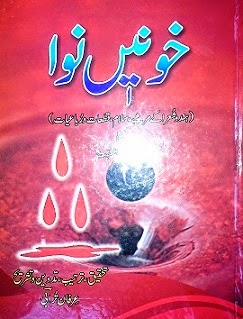AASHOORA: The Alchemy of Sorrow
Khoanaen Nawa is the best to read non-Muslim poets on Karbala
Aaj tak roti hae teray gam mei her mahfil Hussain
Iss mein koi shak nahi to hae jehan ka dil Hussain (Maenk)
There are only two categories of people in the world: those who know they love Hussain(a.s) and those who don’t know though they too, deep in their being, stand witness to the glory that Hussain(r.a) is. And one can club all great thinkers, artists, poets, saints with the first camp. (None can claim to be indifferent to the tragedy of Karbala). One can almost set the love of the Prophet (SAW) and, by implication, love of Hussain(R.A), as a criterion of distinguishing believers from disbelievers.
“Ham haen haediri,” “ham haen hussaini” is indeed a universal slogan and Hussain(a.s) as a symbol of protest “against real suffering” and as a “sigh of the oppressed, the heart of a heartless world, and the soul of soulless conditions” (seeing how Yazids seem to triumph everywhere one recalls Marx’s point about religion) is there to stay as long as justice is sought and justice is not done, Hussain(a.s) will be invoked. It means as long as Yazids are there – Yazids of Capital, of Terror, of centrifugal passions – the fight is on. All of us who have yet to curb temptations of nafs-i-ammara need to remember heroism of Hussain (RA) to succeed in the great odyssey of salvation. Muharram and Aashora constitute the great narrative or a drama of the soul. In fact all quest literature and the genres of elegy and tragedy echo a theme that karbala evokes. Religion understood as making sacred or sacrifice (“ibtida Ismail, intiha Hussain”) is enacting or living the tragedy of Karbala in our soul. It is letting the body be “killed” or better subdued or transcended for the sake of Spirit or Virtue (which include goodness and justice). Transposed existentially Karbala is a battle against the yazid of desire in us. Hussain(a.s) stands for, to use Platonic language, the sovereignty of Intellect against desires or passions.
All these points about Imam Hussain(a.s) are echoed in the anthology that constitutes a definitive contribution to elegiac literature. Reading it one’s faith is refreshed, many unknown poets get resurrected and a new chapter in the dialogue between communities opens up. One perceives a different universe where the powerful symbol and love of the Prophet (SAW) and Hussain (RA) melts the ice of prejudices against different communities. All of us worship Beauty and Love and we differ only in the extent to which we have surrendered the self that covets power or worldly glory – the Empire of Yazid – and got transformed by the Grace of the Beloved.
Reading the poets he has painstakingly anthologized, we come to better understand those whom Muslims would ordinarily imagine to be excluded from the grace emanating from the Prophet (SAW). Reading such verses as:
“Yae haen berkatee ek nam-i-nabi kae
Gam-e-doonu-aalam thikanae lagae hein" or
"Hosh kehta hae unki yaad mei guzrae hayaat/
Aur junoo kahta hae khak-i- toyyiba hi ho jayae" or
Tabeen koi bi nahi daekha Muhammad sa/
Jigar kae zakhm dikhanae madenae chalo (Menk)
“Guzaratae haen jo yaad Hussain maen ham arsh/
Hayat mein wahi lamhae shumaar hotae haen (Arsh) one is simply moved. Great things have been said about sorrow as “the swiftest horse that takes one to perfection,” as the best thing under earth designed for tuition of men, as the wazeefa by thinkers and saints. Our poets sing:
“Naimat koi bi naimat-i-gam ka badl nahi” (Munawwar)
“Gam-i- Shabeer mei pur khoon hou jis ki aankhae/
Bhar kae damen mein wahi lal-o-gohr aata hae and
Her zamanae mein hara gulshan-i-Zohra hoga/
Yom-i-aashoor yehi lae lae kae khabr aata hai (Fani)
“Hindu sahi magr hoo sana khan-i- Mustafa” or
Hae kousari hindoo bi talabgaar-i-Muhammad”
Is wastae na shoal tera muj tek aasaka”
“Khuda tera aashiq tu aashiq khuda ka/
Maen tum donoo per hoo fida ya Muhammad” (Dilooram Kousari)
“Mumin jo nahi hoon to mein kafir bi nahi shad/
Is ramz sae aagah haen sultan-I madeena” (Shaad)
One can cite scores of great devotional or naatiya verse or poetry in honour of Hussain(a.s). It means Hussain (RA)has conquered the world through the beauty of his soul.
Although selections are not often appealing in terms of artistic form, love, devotion, faith, felicity of phrase is noticeable on every page. This is a book that along with Khunaab and few other works would constitute permanent contributions to literature on na’t, hamd and marsiya.
Scholar, compiler, editor, researcher, Turabi is arguably the most important name in research in Kashmir on elegiac poetry in Urdu and Kashmiri. His distinction is his specialization on contribution of non-Muslim poets to elegiac literature. Turabi has been able to single handedly add a significant chapter in scholarship and history of elegiac literature.
http://greaterkashmir.com/news/2014/Oct/30/aashoora-the-alchemy-of-sorrow-8.asp


tuirhinstat_pa Beth Goeckner Download
ReplyDeletejambaiserta